In 1899, George Méliès made the first political film on the Dreyfus Affair. It was a visualization of the debate that animated the press and divided French society, tending to aggravate the situation.
Belle époque. With this feature film, the relationship between cinema and journalism was born. This relationship would continue to develop until Orson Welles‘ 1941 masterpiece Citizen Kane, which follows the death of billionaire newspaper magnate Charles Foster Kane through the investigation of a reporter.
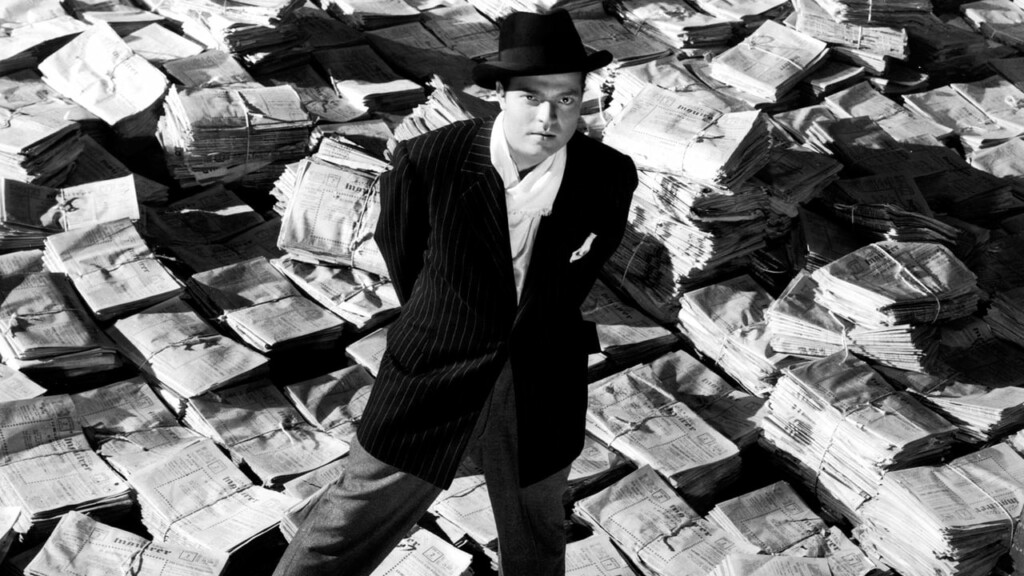
The 7th art thus becomes a means of amplifying journalists’ messages, their work or their major investigations. Considering some recent American works, Tom McCarthy‘s Spotlight in 2015, Steven Spielberg‘s The Post in 2017, we can ask ourselves why the profession of journalist and journalism fascinates filmmakers, here are a few leads …
The journalist, the investigative hero
Filmmakers, fascinated by the heroic potential, self-sacrifice and courage of journalists, their value as counter-powers and vigilantes, sometimes build their plots around this figure alone. Tom McCarthy‘s Spotlight, released in 2015, has as its motto: “No matter who hides the truth, we must reveal it“. Spotlight traces the work of the Boston Globe’s investigative team of journalists in breaking the omerta concerning the role of the all-powerful Church in the sexual abuse of priests. A similar theme can be dealt with from different angles, notably from an intimate angle, detached from any spectacular temptation, as François Ozon does in Grâce à Dieu. Tom McCarthy, for his part, captivated by the figure of the heroic journalist-investigator, tells the story of outraged and courageous ordinary citizens who succeeded in revealing one of the biggest scandals in the United States, through the prism of a heroic investigation that was prevented. The choice of actors is designed to bring out the heroic side of the journalist, and sometimes doesn’t hesitate to play it up… Michael Keaton, Mark Ruffalo and Liev Schreiber have all played superheroes in other films.
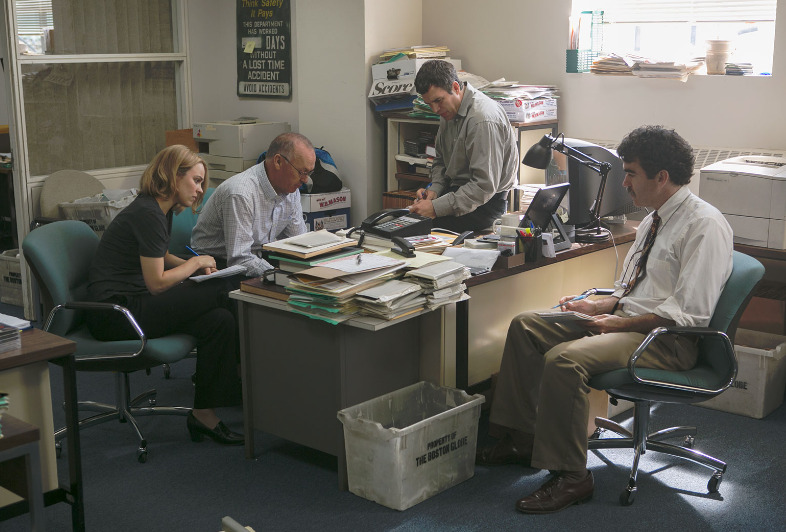
The various long shots of the editorial office, with its many papers protruding from the desks, also allow Tom McCarthy to show how an investigative unit works. They testify to his attraction to the labyrinthine, meticulous nature of the investigation. Mc Carthy‘s approach is based on a simple principle: to allow us to identify with the characters as we watch the pieces of the puzzle being put together. He conveys his fascination with the profession of journalism and involves the viewer in the investigation and narration (the viewer leads his or her own contradictory investigation). In addition, the dark photography allows us to represent the mysterious aspects of the investigation, mirroring the shadowy areas of the inquiry.
In the film Zodiac, director David Fincher focuses on the figure of an investigative journalist, played by Robert Downey Jr., who goes mad, and on the cartoonist (Jake Gyllenhaal) who takes over the case. These figures perfectly illustrate the media’s obsession with high-profile court cases. In this category of thrillers, where we find the figure of the investigative journalist, we find, for example, David Fincher‘s Seven, Ali Abbasi‘s Mashhad Nights, The Ghost Writer – starring Ewan McGregor, Pierce Brosnan – and Clint Eastwood‘s True Crime…
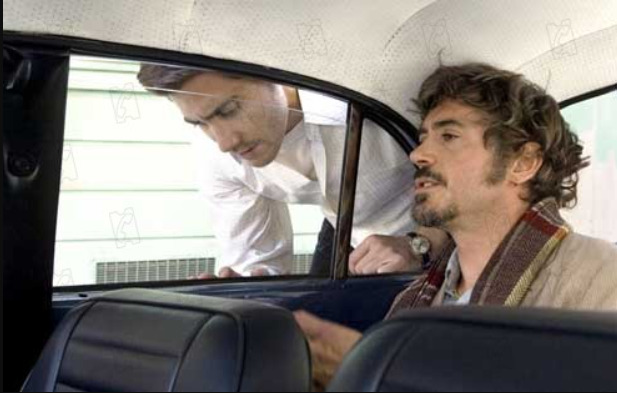
To round off this mini-selection of films about investigative journalists, we must mention Alan J. Pakula‘s classic The President’s Men, which explores the first seven months of the Watergate affair.
The profession of journalist allows filmmakers to tackle the subject of freedom of expression
Making films about the defense of freedom of expression in the world of journalism sometimes allows filmmakers to highlight struggles that touch them personally. Steven Spielberg‘s 2017 film The Post, for example, illustrates this bias, recounting how the Washington Post decided to publish secret government files on the stalemate in the Vietnam War.
During the promotional tour for The Post, Spielberg said he felt “a sense of urgency to make The Post”, stressing that “many people today are hungry and thirsty for the truth”, in reference to the tensions towards the press in the USA, and to the current situation and struggles.
For his 31st film, Steven Spielberg questions the place of women in society, and by extension in journalism. Katherine Graham, director of the Washington Post, played by Meryl Streep, becomes the epicenter of the shots. Spielberg chooses to film her in a fixed shot, while the camera follows Tom Hanks in perpetual motion. The story’s central decision, also taken by the head of the Washington Post (also the film’s producer), to publish these documents, causes an earthquake in the United States. Only a charismatic character with strong shoulders could make such a decision. Spielberg‘s powerful motif serves his film well. The impressive long shot of the Washington Post newspaper’s printing room on the subject of the Pentagon Papers represents the victory of a free press.
Warren Beaty‘s film Reds also evokes the subject of freedom of expression, through the true story of John Reed, a militant American communist journalist who covered the Russian Revolution of October 1917. He went on to write the bestseller, Ten Days That Shook The World. Another feature film that highlights the need for a free press is Agnieszka Holland‘s Mr Jones. This feature film recounts part of the life of the brilliant, idealistic British journalist Gareth Jones, who risked his life to expose the terrible genocide (Holodomor) by starvation organized by Stalin in Ukraine in 1933.
The journalistic profession as a mise en abyme for the filmmaking profession
The journalist’s profession as a mise en abyme of the filmmaker’s professionOver and over again, the link between filmmakers and journalism can also be explained by the resemblance between the two professions. Oliver Stone‘s Salvador, released in 1986, offers a veritable mise en abyme for the filmmaker, who films just like the main character Richard Boyle (James Woods), a war journalist taking photos of the civil conflict in El Salvador. Long before him, Buster Keaton amused himself in The Cameraman.
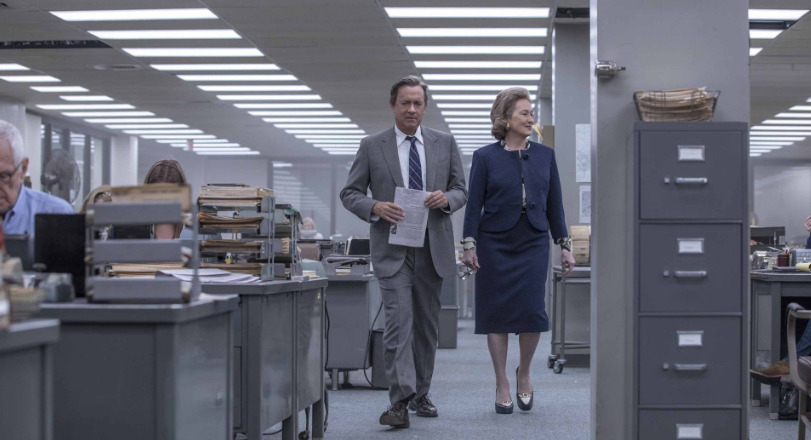
The harsh reality of being a war reporter is well represented in Oliver Stone‘s feature-length film, which spares viewers nothing with numerous long shots of the piles of corpses that Boyle and John Savage, another photojournalist, face. Since the war reporter sees everything, the camera shows us everything. The film plunges the viewer right into the heart of the horror. Oliver Stone wrote the screenplay with the real Richard Boyle, American journalist, photographer and author. The journalist’s writings and story inspired him to direct the film. The profession of war reporter has also inspired Antonioni (Profession reporter, which focuses on the hero’s life without reference points, his loss of identity), Winterbottom (Welcome To Sarajevo), Sharunas Bartas (Frost), Danielle Arbid (Un homme perdu) and recently Guillaume de Fontenay with Sympathie pour le diable in memory of Paul Marchand.
A fascination with the inner workings of journalism
At the Cannes Film Festival in 2021, The French Dispatch dealt with journalism in Wes Anderson‘s dream France. The film takes us into the life of a fictional weekly and the daily lives of its colorful journalists.
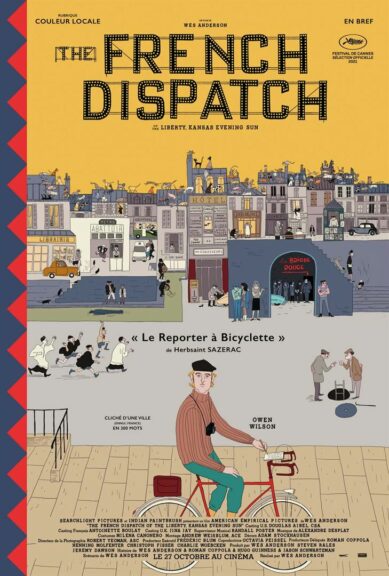
In the same year, 2021, far removed from Andersonian fantasy, Bruno Dumont offered, with France, his scalpel-sharp vision of the aberrations that can lead journalists, lost souls who forget their primary mission, blinded by the quest for excessive buzz and media stunts, towards a reversal of values, a morbid fascination, the cornerstone of a loss of existential meaning, so symptomatic of our times.
Trying to determine all the reasons behind the abundance of films dealing with journalism cannot stop at these few examples. Applying a classification would merit an entire thesis, and we have no intention of doing so here; we’re simply shedding light on a few undeniable motives.
We’ve put together a list below to help you make this connection:
Films about the profession of journalist and some of its abuses
- The Cameraman – Buster Keaton (1928)
- Friday Lady – Howard Hawks (1940)
- Citizen Kane – Orson Welles (1941)
- Ace in the Hole – Billy Wilder (1951)
- Je veux vivre ! (I want to live) – Robert Wise (1958)
- Hands over the City – Francesco Rosi (1963)
- The Toy – Francis Weber (1976)
- Tout le monde il est beau tout le monde il est gentil – Jean Yanne (1972)
- Profession: Reporter (Professione: reporter) – Michelangelo Antonioni (1975)
- Network – Sidney Lumet (1976)
- The Toy by Francis Veber (1976)
- The Forger by Volker Schnoldorf (1981)
- All the President’s Men – Alan J. Pakula (1976)
- The Year of Living Dangerously – Peter Weir (1982)
- The Killing Fields – Roland Joffé (1984)
- Street Smart – Jerry Schatzberg (1987)
- Man bites dog (C’est arrivé près de chez vous) – Rémy Belvaux, André Bonzel, Benoît Poelvoorde (1992)
- The Pelican Brief by Alan J. Pakula (1993)
- Las Vegas Parano – Terry Gilliam (1998)
- Revelations (The Insider) – Michael Mann (1999)
- Bel Ami – Philippe Triboit (2005)
- Good Night, and Good Luck – George Clooney (2005)
- The Bang Bang Club – Steven Silver (2010)
- Les Nouveaux Chiens de garde – Gilles Balbastre, Yannick Kergoat (2012)
- Bel Ami –Declan Donnellan and Nick Ormerod (2012)
- Spotlight – Tom McCarthy (2015)
- Truth – James Vanderbilt (2015)
- Snowden – Oliver Stone (2016)
- The Post – Steven Spielberg (2017)
- French Dispatch – Wes Anderson (2021)
- France – Bruno Dumont (2021)
- Lost Illusions – Xavier Giannoli (2021)
Films that use a journalist to investigate and expose scandals
- The Man Who Shot Liberty Valance – John Ford (1962)
- Down on the City – Francesco Rosi (1963)
- The Mattei Affair – Francesco Rosi (1972)
- Un Linceul n’a pas de poches – Jean-Pierre Mocky (1974)
- All the President’s Men – Alan J. Pakula (1976)
- A Thousand Billion Dollars – Henri Verneuil (1982)
- The Pelican Brief – Alan J. Pakula (1993)
- The Insider – Michael Mann (1999)
- Good Night, and Good Luck – George Clooney (2005)
- The Men who stare at goats – Grant Heslov (2009)
- The Great Game – Nicolas Pariser (2015)
- Snowden – Oliver Stone (2016)
- The Post – Steven Spielberg (2017)
- Dark Waters – Todd Haynes (2019)
- The Report – Scott Z. Burns (2019)
- Investigation into a State Scandal – Thierry de Peretti (2020)
- Minamata – Andrew Levitas (2021)
- She Said – Maria Schrader (2022)
Films that use journalists to tell the story of a country
- Z – Costa-Gavras (1969)
- Reds – Warren Beatty (1981)
- Missing(Porté disparu) – Costa Gavras (1982)
- Under Fire – Roger Spottiswoode (1983)
- The Killing Fields – Roland Joffé (1984)
- Salvador – Oliver Stone (1986)
- Good Morning, Vietnam – Barry Levinson (1987)
- Mr. Jones – Agnieszka Holland (2019)
- Sarah’s Key (Elle s’appelait Sarah) – Gilles Paquet-Brenner (2010)
- All the President’s Men – Alan J. Pakula (1976)
- Absolute Power – Clint Eastwood (1997)
- The Interpreter – Sydney Pollack (2005)
- Good Night, and Good Luck – George Clooney (2005)
- The Post – Steven Spielberg (2017)
- Les filles du soleil – Eva Husson (2018)
Films that uses journalism to paint portraits
- Almost Famous – Cameron Crowe (2000)
- The Life of David Gale – Alan Parker (2003)
- Le promeneur du champ de Mars – Robert Guédiguian (2005)
- Truman Capote – Bennett Miller (2005)
- Frost/Nixon – Ron Howard (2008)
- The King’s Speech – Tom Hooper (2010)
- My Week with Marilyn – Simon Curtis (2011)
- 3 days in Quiberon – Emily Atef (2018)
- A beautiful day in the neighborhood– Marielle Heller (2019)
Films that portray journalists:
- Citizen Kane – Orson Welles (1941)
- Shock corridor – Samuel Fueller (1963)
- La Une – Billy Wilder (1974)
- Network – Sidney Lumet (1976)
- The Paper – Ron Howard (1994)
- Larry Flynt – Miloš Forman (1996)
- Shattered Glass – Billy Ray (2003)
- The Diving Bell and the Butterfly – Julian Schnabel (2007)
Films featuring imprisoned journalists:
- Out of Life – Maroun Bagdadi (1991)
- A Mighty Heart – Michael Winterbottom (2007)
- Rosewater – Jon Stewart (2014)
- Escape from Pretoria – Francis Annan (2020)
Thrillers or film noir where journalists lead the investigation:
- Each Dawn I Die – William Keighley (1939)
- Call Northside 777 – Henry Hathaway (1948)
- Deadlines USA – Richard Brooks (1952)
- While the City Sleeps – Fritz Lang (1956)
- The China Syndrome – James Bridges (1979)
- Fletch – Michael Ritchie (1985)
- The Silence of the Lambs – Jonathan Demme (1991)
- Shadow conspiracy – George P. Cosmatos (1997)
- True Crime – Clint Eastwood (1999)
- Seven – David Fincher (1995)
- Shattered Glass – Billy Ray (2003)
- Zodiac – David Fincher (2007)
- State of Play – Kevin Macdonald (2009)
- Secret in Their Eyes (El secreto de sus ojos) – Juan José Campanella (2009)
- The Ghost Writer – Roman Polanski (2010)
- The Girl with the Dragon Tattoo (Millénium : Les hommes qui n’aimaient pas les femmes) – David Fincher (2011)
- Nightcrawler – Dan Gilroy (2014)
- Suspect number one – Daniel Roby (2020)
- Mashhad Nights – Ali Abbasi (2022)
Films in which journalists infiltrate a milieu :
- Platinium Blonde – Franck Capra (1931)
- Absence of Malice – Sydney Pollack (1981)
- The Year of Living Dangerously – Peter Weir (1982)
- Salvador – Oliver Stone (1986)
- State of Grace – Phil Joanou (1990)
- The Saint of Fort Washington – Tim Hunter (1993)
- The Hoax – Lasse Hallström (2006)
- Shattered Glass – Billy Ray (2003)
- The Informant! – Steven Soderbergh (2009)
- The Imposter – Bart Layton (2012)
- Kill the Messenger – Michael Cuesta (2014)
- Spotlight – Tom McCarthy (2015)
- Black Mass – Scott Cooper (2015)
- The Infiltrator – Brad Furman (2016)
- The Whistleblower – Larysa Kondracki (2010)
- The Bay of Silence – Paula van der Oest (2021)
- Ouistreham – Emmanuel Carrère (2021)
Other films featuring journalists:
- After Office Hours – Robert Z. Leonard (1935)
- A Woman Rebels – Mark Sandrich (1936)
- Love Is News – Tay Garnett (1937)
- Arise, my love – Mitchell Leisen (1940)
- Meet John Doe – Frank Capra (1941)
- June Bride – Bretaigne Windust (1948)
- The Big Clock – John Farrow (1948)
- La Folle Enquête (On Our Merry Way) – Leslie Fenton, King Vidor (1948)
- Rear Window – Alfred Hitchcock (1954)
- Run for the sun – Roy Boulting (1956)
- Top Secret Affair – Henry C. Potter (1957)
- What’s up, Pussycat? – Clive Donner (1965)
- La Salamandre – Alain Tanner (1971)
- Masques – Claude Chabrol (1987)
- Superman – Richard Donner (1978)
- Hero – Stephen Frears (1993)
- Just Married (Almost) – Garry Marshall (1999)
- College Attitude – Raja Gosnell (1999)
- 28 days – Betty Thomas (2000)
- The Mothman Prophecies – Mark Pellington (2002)
- Scoop – Woody Allen (2006)
- Blood Diamond – Edward Zwick (2006)
- Leatherheads – Georges Clooney (2008)
- The Battle of Solferino – Justine Triet (2013)
- …

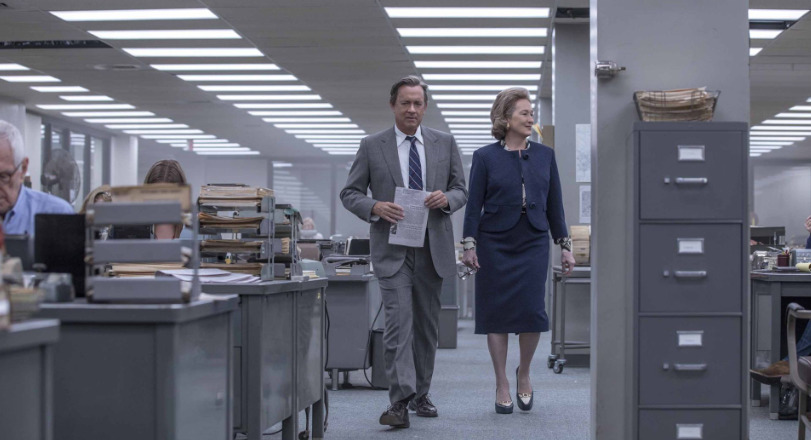




Be First to Comment